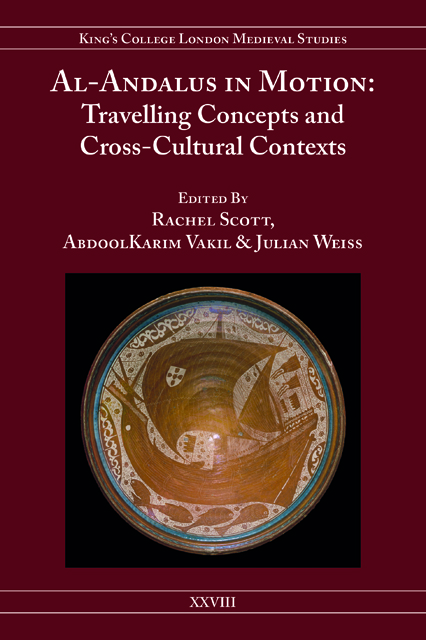Book contents
- Frontmatter
- Contents
- List of Illustrations
- Acknowledgements
- Notes on Contributors
- Part I Departure Points
- Part II Translating Al-Andalus: Travelling across Languages
- Part III (Re)Visions of Al-Andalus in Diaspora and Exile
- Part IV Andalusi Space as Node and Utopia: Europe, Islam, Empire
- Part V Al-Andalus and the Politics of Religious Identity
- Part VI Legacies, Landscapes and ‘Travel Buildings’
- Epilogue
- Index
6 - Andalusi Space and the European Network in the German Rolandslied
Published online by Cambridge University Press: 02 June 2023
- Frontmatter
- Contents
- List of Illustrations
- Acknowledgements
- Notes on Contributors
- Part I Departure Points
- Part II Translating Al-Andalus: Travelling across Languages
- Part III (Re)Visions of Al-Andalus in Diaspora and Exile
- Part IV Andalusi Space as Node and Utopia: Europe, Islam, Empire
- Part V Al-Andalus and the Politics of Religious Identity
- Part VI Legacies, Landscapes and ‘Travel Buildings’
- Epilogue
- Index
Summary
Karl, gotes dienestman,Charles, servant of God,
ile in Yspaniam!Hurry to Yspania!
got hat dich erhoeret,God has answered your prayer
daz liut wirdet bekeret.The people will be converted.
These words are spoken by an angel in a dream to Charlemagne in the German Rolandslied, an adaptation of French material, compiled around 1170 by a certain ‘phaffe Chunrat’ [priest Konrad], who names himself in the epilogue (l. 9079). The angel's exhortation, God's answer to the emperor's prayers and to his sorrow upon learning that the people of Yspania do not follow the Christian religion, places the Iberian space at the centre of Charlemagne's mission. Hearing these words, Charlemagne assembles his troops and heads to Yspania. There, the emperor attempts to negotiate the Muslims’ conversion to Christianity, but he is betrayed by one of his men, Genelun. As the Frankish army returns to Aachen, their rear-guard is attacked, leading to a long battle between Muslim and Christian forces.
Iberia plays a major role in the Rolandslied as an ambiguous two-way space: it completes and consolidates Charlemagne's singular European empire, while simultaneously offering access to a plural Muslim world. This imaginary Peninsula conflates Yspania with Muslim controlled Iberia (the area now generally called al-Andalus) and the narrative strategies that enable this conflation entail processes of identity building that lie at the core of the text. Beyond al-Andalus, the Iberian Peninsula provides connections to Africa and Asia, as well as to Muslim troops from all over the world, who come to embody a heathendom as magnificent and heterogeneous as Charlemagne's Christendom is divine and united. The Rolandslied uses religious identities to consolidate political unity. In the case of the Christians, religious and political identities are juxtaposed and complement each other through the figure of Charlemagne. In the Andalusi camp, however, religion does not function as a unifying political factor, since Charlemagne's Muslim enemy is characterised by plurality.
The text participates on a literary level in what historian Robert Bartlett famously termed the ‘Europeanization of Europe’ (1994: 269), which he defines as the formation of an increasingly homogeneous society across Eastern and Western Europe in the High Middle Ages created by the spread of a common cultural identity linked to Latin Christendom and produced by the diaspora of the Franks.
- Type
- Chapter
- Information
- Al-Andalus in MotionTravelling Concepts and Cross-Cultural Contexts, pp. 157 - 178Publisher: Boydell & BrewerPrint publication year: 2021



